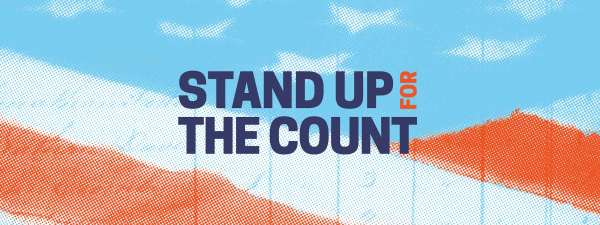Census 2020 – Stand up for the count

Transcript
Transcript begins.
[A montage of footage shows people of various ages and races in scenes from daily American life: a farmer surveys a cornfield, a father in a suburban neighborhood hugs his school-age daughters, a newborn awakens in a crib, a boy blows out birthday candles at a family celebration, a young couple travels by train.]
Every 10 years, the census tells the story of America. That’s 328 million of us … and counting. It tells us about newcomers and new arrivals, how we’re living, where we’re going, and what we’re learning.
[A montage of American iconography includes a US map with a ticking population clock, the Stars and Stripes waving in the wind, a sketch of the Founding Fathers.]
From the time of Thomas Jefferson, the census has tracked growth and change in our country and served as a pillar of our democracy, transcending party and tribe. Including the census in our Constitution, marked a turning point in world history. In the hands of kings and emperors, a census had historically been a tool of oppression—a ledger used to confiscate property and conscript soldiers. But the founders flipped that model on its head. Our census was designed to empower the governed, granting us representation and political power based on the population of our communities.
Today, census data serves as the basis of a staggering $800 billion in federal disbursements to state and local governments. It is the gold standard of demographic information for businesses, researchers, and government. But with the 2020 census fast approaching, we have a problem. Congressional appropriations have fallen short over the past decade, which will lead to a projected 50 percent drop in the number of local and regional census offices and a 25 percent reduction in field staffers.
[A montage of footage shows preschoolers playing with blocks, a man crossing a footbridge in a wheelchair, a doctor performing a sonogram.]
That means many communities are at risk of being undercounted—and the programs serving them underfunded—affecting groups and services all across America.
An inaccurate census count has cascading consequences. Regions that are growing won’t have fair political representation in Congress and state legislatures. Businesses won’t have the data they rely on to expand or find labor.
[A montage of footage shows a disaster-relief staging area, residents being evacuated by boat in the aftermath of a flood, bumper-to-bumper traffic on a five-lane highway, a man at a bus stop shaking his head and sighing over the long wait.]
Natural disaster planning and emergency services are compromised. Traffic gets worse. Health programs miss their mark. Funding will drop for public libraries, school lunch programs, and early childhood education. Fair housing and other civil rights laws will be harder to enforce, and public transportation will fail to meet demand.
At the same time, we face a technological challenge. The 2020 census is the first that can be completed online. That could make it easier for many people to respond—but only if the technology works. Experts say an online census could be vulnerable to crashes, hackers, and other interference. Another challenge is the current political climate, which has stirred fear in immigrant communities. And a proposed question about citizenship status—now being fought by two dozen states—threatens to scare people away from the count.
These are urgent challenges. And we’re mobilizing to overcome them. Join us.
[On-screen text lists organizers, advocates, technologists, clergy, researchers, communicators, policy makers, funders, and lawyers.]
If we work together, we can ensure a fair and accurate census. Join us and stand up for the count. Stand up to support your neighbors and all the people who call this country home. Stand up to defend fair political representation. Stand up to protect economic opportunity. Stand with us. Stand up for the count.
[on-screen graphic: Ford Foundation logo]
Accessibility Statement
- All videos produced by the Ford Foundation since 2020 include captions and downloadable transcripts. For videos where visuals require additional understanding, we offer audio-described versions.
- We are continuing to make videos produced prior to 2020 accessible.
- Videos from third-party sources (those not produced by the Ford Foundation) may not have captions, accessible transcripts, or audio descriptions.
- To improve accessibility beyond our site, we’ve created a free video accessibility WordPress plug-in.
The census is in trouble. Here’s why, and what you can do about it. The American Constitution mandates that once every decade we tally how many people live in the United States. This decennial census tells us who we are as a country: where we live and how we live, where we’ve been and where we’re going, who our neighbors are and what our communities look like. As we approach 2020, there are serious challenges facing the census: – the Census Bureau is underfunded. – the 2020 census will be the first conducted online creating the potential for hacking and system crashes, and online disinformation campaigns – the current political climate could discourage participation. These are big problems, but important work to overcome them is well underway. A strong coalition of foundations and advocates are leveraging resources and relationships, working in partnership to assure a fair and accurate count.
